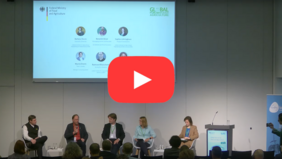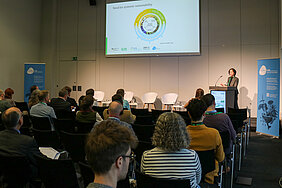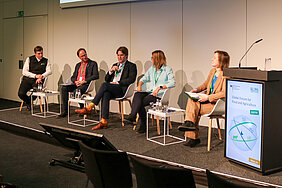The GFFA panel session "Unlocking Systemic Innovations for a Sustainable Bioeconomy" on January 17, 2025, highlighted the need for a sustainable and circular bioeconomy to address global agri-food crises. Organized by the Leibniz Institute for Agricultural Engineering and Bioeconomy (ATB) and the Leibniz Centre for Tropical Marine Research (ZMT) within the realm of the Leibniz Lab Systemic Sustainability, the session emphasized the importance of innovations and the challenges in their implementation.
“Bioeconomy is not automatically sustainable and circular.” Barbara Sturm
In her keynote, Barbara Sturm (ATB) underscored the necessity of changing our agri-food system and that we need technological developments, such as those at ATB, to drive systemic changes. She pointed out that the bioeconomy is not automatically sustainable and circular, and innovations need to be site-specific as well as economically viable and need to work in different scenarios. She thus agreed with different panelist. Olaide Aderibigbe (Nigeria’s National Horticultural Research Institute) for example presented three key innovations: decentralized and site-specific food systems, circular economy and digital agriculture. She highlighted the role of the Inclusive Innovation Platform, which can scale sustainable agricultural innovations through cross-sector collaboration and resource access.
“We don’t have the time to do everything right. It is more important to get going." Benedikt Bösel
Benedikt Bösel (Gut&Bösel, Finck Foundation) discussed regenerative agriculture and the integration of social aspects, emphasizing the importance of agroforestry and composting. He pointed out there is need for a strong network of time- and funding independent living labs to create results that can be evaluated.
“There is not one solution, local adaption is necessary, around the world." Susanne Bodach
The panel investigated what makes innovations fail and succeed. Raimund Bleischwitz (ZMT) discussed novel foods and the blue bioeconomy, while Fabian Blöchl (Farmers’ Association Brandenburg) shared best practices such as innovations in tilling systems and the need to show these on field days to facilitate adoption. Susanne Bodach (International Water Management Institute) stressed the need for local adaptations and the importance of circular bioeconomy hubs, gender equality, and social inclusion. Marnix Doorn (IAK Agrar Consulting) questioned the role of public policy in fostering innovations and called for more economy and economists in the bioeconomy. He noted that significant funds are allocated to feasibility studies, but too little goes into the adoption and application of innovations.
The discussion with the audience highlighted the need to integrate all stakeholder in living labs (society, private sector, research etc.) and transformation processes to create drivers of behavior change. It further questioned power structures and emphasized the importance of ensuring that research funding, post-colonial influences etc. do not exert power over people. Overall, the session provided valuable insights into promoting systemic sustainability through innovations in the green and blue bioeconomy.
Keynote speaker and panelists:
- Barbara Sturm, Leibniz Institute for Agricultural Engineering and Bioeconomy (ATB)
- Benedikt Bösel, Gut&Bösel, Finck Foundation
- Olaide Aderibigbe, National Horticultural Research Institute, Nigeria
- Raimund Bleischwitz, Leibniz Centre for Tropical Marine Research (ZMT)
- Fabian Blöchl, Farmers’ Association Brandenburg
- Susanne Bodach, International Water Management Institute
- Marnix Doorn, IAK Agrar Consulting GmbH
Background
The Global Forum for Food and Agriculture (GFFA) is a major annual event that brings together policy makers, academia, business and civil society to develop solutions for future food security. This year, the ATB and the ZMT jointly organised an expert panel entitled "Unlocking systemic innovations for a sustainable bioeconomy".



